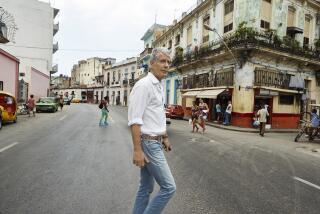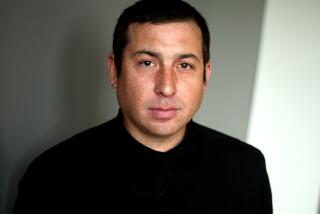STAGE REVIEW : ‘Sand & Stone’ Poetry Reading Lacks Grit
“Sand and Stone,” a program of Palestinian and Israeli poetry at the Mark Taper Forum’s Itchey Foot Literary Cabaret, gets its currency chiefly from the daily pounding at our ears of the racking turmoil of the Palestinian intifada , or revolution, in Israel and the occupied territories. Recent events have heightened our awareness of the complex struggles and dilemmas experienced on both sides of the great Middle Eastern divide.
Dilemma and anguish: the nectar of poetic expression.
Marc Steven Dworkin seized on this explosive equation, uniquely made up of division and similarity, to fashion an evening of ethnic poetry with a three-way point of view: Arab, Israeli and American. That third element turns it into a counterfeit proposition.
A two-way juxtaposition might have given us a sense of the inextricability of the situation. For all of the concern of American Jews about the alarming developments in Israel, the battle and the conflict are not theirs. By injecting an extraneous (and more than a little self-important) American slant, Dworkin has made marshmallow sauce of an evening that was already too long on sentiment and too short on ferocity.
At bottom, his insistence on an American view has little to do with the work of the contributing poets chosen by Dworkin with a certain numerical evenhandedness (eight Arabs to seven Israelis). Their names are unlikely to ring any bells with American readers, but they can’t be blamed for the tameness of their words. Clearly, Dworkin made his selections to emphasize the wistful and the lyrical rather than the rebellious or angry. (Humdrum translations are uncredited and come from more than one source.) The American voice, however, is Dworkin’s own.
And a telling voice it is, since the program is a striking example of an artist’s power to shape events subjectively--and, in this case, to distort a deeper and far more complex and interesting truth.
Given the romantic selections, and director Deborah LaVine’s willingness to go along with the wanness of the choices, what we get is four overly reverential actors--Stefan Gierasch, Zitto Kazann, Sam Shamshak and Rita Zohar--either waxing lyrical and exalted or wallowing in restrained and rueful solemnity.
The effect is enervating and more than a little absurd. “Sand and Stone” hardly plumbs the mine fields of its subject matter and must even run counter to its adapter’s and director’s well-meaning--if misguided--intentions.
One has to assume that Dworkin and LaVine were too caught up in their experiment to hear the hollow ring of such statements as “ Intifada , you would think that someone would have seen the uprising coming. . . .” or “Jewish soldiers . . . Who would have thought we would have been so good at it?” But did they really not notice the meaninglessness of “The healing begins when you feel the pain of others”? What healing? Whose healing?
One cannot co-opt other people’s problems any more than one can co-opt another nation’s language or another culture’s folklore. You can illuminate them, something that, with the exception of musician Rico Orell’s fine but too brief musical contributions (including the playing of a tarabukka , or Middle Eastern hand drum), this program does not do. As for a line such as “As an American Jew, I am part of the struggle,” it is not only offensive, it’s kosher baloney.
The Israeli-Palestinian struggle seen through the Dworkin-LaVine prism settles for being remote, benign, heroic and trivializing.
Real struggle, like real war, smells bad. It’s bloody, brutal and dirty. While the poet speaks of the beauty of the olive tree, National Public Radio only last week told us about this year’s bumper olive crop in the West Bank being willfully and deliberately abused and wasted to suit the political ends of both warring factions.
There is nothing pretty in that. Such tragic senselessness and the despair it engenders is something that “Sand and Stone,” with all the grit implied in such a title, needed to make us feel--and doesn’t.
At the Itchey Foot Ristorante, 801 W. Temple St., Sunday and Nov. 13 only at 6 p.m. Food and beverage service begins at 4 p.m. Tickets: $6; (213) 972-7231.
More to Read
Sign up for our Book Club newsletter
Get the latest news, events and more from the Los Angeles Times Book Club, and help us get L.A. reading and talking.
You may occasionally receive promotional content from the Los Angeles Times.








